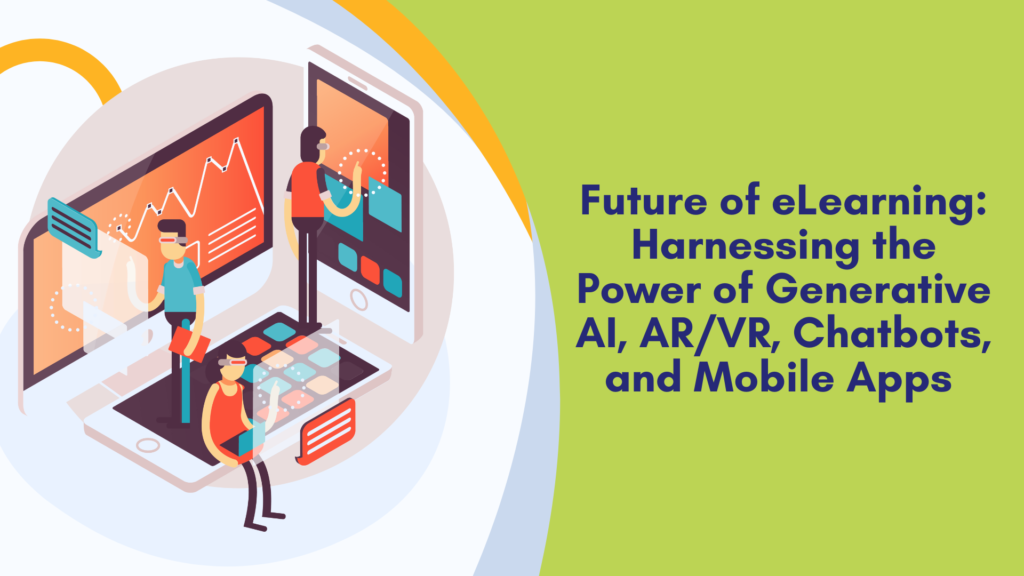Introduction Learning has always been an integral part of human evolution, but with modern technologies, it has become more personalized, accessible, and engaging. In this article, we’ll explore the future of eLearning and how generative AI, AR/VR, chatbots, and mobile apps transform our learning, making it more immersive, interactive, and effective.
Introduction to Generative Artificial Intelligence
Generative AI is a powerful tool transforming how we learn by creating customized content that meets individual needs. It is based on machine learning algorithms that can analyze large volumes of data and generate relevant content that can be used for learning. Some key benefits of generative AI in learning include personalization, scalability, and cost-effectiveness. With generative AI, learners can access customized learning materials that cater to their unique learning needs, resulting in better engagement, retention, and performance.
Creating Conversational Learning Interface - Chatbots

Chatbots are revolutionizing the way we interact with learning content, making it more conversational, engaging, and intuitive. They are virtual assistants that can simulate human conversations, allowing learners to ask questions, receive feedback, and access learning content on demand. With chatbots, learners can get personalized guidance, real-time support, and instant feedback, making learning more effective and efficient. Chatbots are also scalable, cost-effective, and accessible, making them ideal for delivering learning content to large and diverse audiences.
Designing Immersive Learning with Augmented and Virtual Reality
AR/VR is transforming the way we learn by creating immersive and interactive learning experiences that are both engaging and effective. AR/VR technologies use digital content to augment or replace real-world experiences, creating a highly immersive and interactive learning environment. With AR/VR, learners can explore complex concepts, practice skills, and interact with virtual objects, making learning more engaging and effective. AR/VR can also be used to simulate real-world scenarios, providing learners with a safe and controlled environment to practice skills and apply knowledge.
Delivering Learning on Any Device

Mobile apps are transforming the way we learn by making learning content accessible anytime, anywhere, and on any device. Mobile learning apps can be accessed on smartphones and tablets, allowing learners to access learning content on the go, whether they are commuting, traveling, or working remotely. With mobile learning apps, learners can access bite-sized learning content, microlearning modules, and video-based content, making learning more accessible and convenient. Mobile apps also provide learners with a personalized and engaging learning experience, making learning more effective and enjoyable.
Learning in the Flow with Modern Performance Support Systems
Modern performance support systems are transforming the way we learn by providing learners with real-time support, guidance, and feedback in the context of their work. These systems use AI-powered tools and technologies to deliver learning content in the flow of work, allowing learners to apply knowledge and skills to real-world scenarios. With performance support systems, learners can get personalized guidance and feedback on demand, making learning more effective and efficient. Performance support systems also help learners to apply knowledge and skills to real-world scenarios, increasing retention and performance.
Learning Analytics to Evaluate Impact, Adapt and Personalize for Each Learner

Learning analytics is transforming the way we learn by providing insights into learners’ behavior, preferences, and performance, allowing organizations to adapt and personalize learning content for each learner. Learning analytics uses AI-powered tools and technologies to track and analyze learners’ behavior, identifying patterns and trends that can be used to improve the learning experience. With learning analytics, organizations can evaluate the impact of learning content, adapt, and personalize learning content for each learner.
Conclusion
Learning and development professionals who embrace the power of generative AI, AR/VR, chatbots, and mobile apps will lead their organizations to new heights of productivity, engagement, and innovation. The future of eLearning is not just about delivering content; it’s about designing learning experiences that empower learners to develop skills and knowledge that drive business results.
Learning analytics, powered by AI, provides valuable insights into learner behavior and performance, enabling learning professionals to adapt and personalize content to suit individual learning styles. Additionally, modern performance support systems help learners apply their newfound knowledge and skills to their work in real time, increasing productivity and job satisfaction.
Organizations must reimagine their learning strategies to achieve this goal and adopt a multi-faceted approach that leverages the latest technologies. With generative AI, chatbots, AR/VR, and mobile apps, learners can access learning content anytime, anywhere, and on any device. They can receive personalized feedback, engage in interactive simulations, and collaborate with peers, making learning an enjoyable and impactful experience.
At Instancy, we are committed to staying at the forefront of these advancements and creating next-generation learning solutions that incorporate the latest technologies. Our platform and solutions expand blended learning to include chatbots, augmented reality, virtual reality, mobile learning apps, and learning analytics. Let’s work together to unlock the full potential of learning. Contact us to view a demo and discuss how we can help improve knowledge-worker job performance and business productivity with tailored learning systems.




